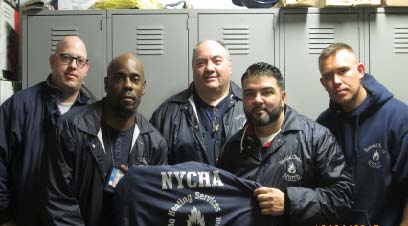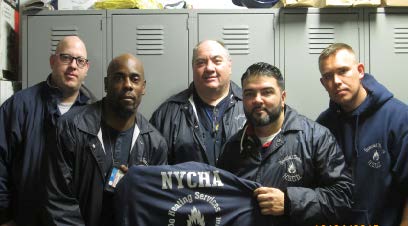All-Hands Response Keeps Boilers Operating in Record Cold

NYCHA was ready when the winter of 2016 came calling on Sunday, February 14. Just a few weeks after Winter Storm Jonas buried New York with a record two-foot snowfall, the frigid Valentine’s Day forecast sent NYCHA’s rapid response teams and other staff back into action.
Due to years of federal funding reductions and state disinvestment, nearly half of NYCHA’s 2,000 boilers are past their useful life and in need of replacement, making careful monitoring and quick response to cold-related problems essential.
With nearly 2,000 boilers working overtime to combat the arctic blast, NYCHA deployed its rapid response teams to nearly 90 developments in a 48-hour period to address major and minor heating and hot water-related issues.
Staff in the Customer Contact Center worked mandatory overtime during the long weekend to handle almost 10,500 weather-related calls.
More than 200 heating plant technicians, plumbers, electricians and welders—in addition to outside vendors —worked each day, around the clock, to manage emergency outages Saturday through Monday night. Twenty- four hour watch teams from Operations, the Emergency Services Department and the Heating Management Department monitored NYCHA’s 21 mobile boilers at Sandy- impacted developments to deploy rapid response teams as needed.
“All of the more than 200 involved staff pulled together as a team to keep our aging boilers and other equipment up and running to minimize the impact of the extreme cold weather on residents’ safety and comfort,” said Director of Heating Management Services Robert Knapp, a 31-year veteran. “These staff should feel extremely proud of their preparation and monitoring of equipment through the weekend, and their valiant responses to incidents.”

Response Highlights
Heating Management Services and other staff inspected all boiler rooms ahead of the cold weather front to identify any equipment issues and the 21 mobile boiler plants at Sandy-affected developments had already been pre-treated and winterized to prevent freeze damage and outages. As a result of the careful preparation, only six major heat outages occurred, five of which lasted about two hours, from issues such as broken steam risers and supply lines, broken pipes, and a gas service disruption. The affected developments were Clinton, Stapleton, Leavitt, and Patterson Houses, Independence Towers, and Samuel Apartments.
Two major hot water outages, lasting an average of 11 hours, occurred at Hope Gardens and Pomonok Houses. Most of the remaining boiler or equipment problems brought only a minor reduction in heating and hot water temperature for residents. The extra monitoring paid off when the internal boilers at Throggs Neck Houses were struggling to maintain steam pressure as demand for heat increased. Soon after this was detected, Heating Management Services and Capital Projects Administration staff worked side by side to install a mobile boiler to supplement the regular boiler plant and restore full steam pressure.
“We worked in two degree weather on Valentine’s Day, all day and all night until 1:00 a.m.,” said Resident Buildings Superintendent Marco Acevedo, “so that residents of the Throggs Neck Houses had adequate heat for their loved ones during this severe weather event.”
“The mobile boiler that was installed in 24 hours would normally take a few weeks to install,” said Mr. Knapp.
Loss of steam pressure also occurred at Pomonok Houses in Queens, due to diminishing gas supply from National Grid. “Quick-thinking staff onsite realized the problem and solved it, averting what could have been a much larger problem by converting three gas boilers to run on oil, increasing pressure to all the remaining boilers,” Mr. Knapp explained.
“This was at the coldest point of the cold,” recalled Resident Buildings Superintendent Anthony Rivera. “Our two maintenance workers Latonia Burgon and Mark Cochran deserve a lot of credit for recognizing the problem and taking immediate action when they saw the pressure dropping,” he said.
In Manhattan, Washington Houses Resident Association President Michael Lopez remarked, “This was the coldest weekend on record here but our heat did not stop. I am very positive about that. They calibrated the system and it worked very well.”
Mr. Lopez also recalled seeing flyers warning residents about the record cold weather and assuring them that NYCHA staff would be on hand to respond.
The Mayor’s Office expressed appreciation for NYCHA’s all-hands response to the cold and its participation in the Citywide Winter Weather Emergency Plan.







